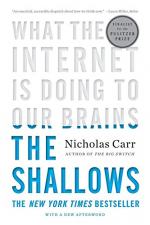
|
| Name: _________________________ | Period: ___________________ |
This test consists of 5 multiple choice questions, 5 short answer questions, and 10 short essay questions.
Multiple Choice Questions
1. What famous work of Saint Augustine's does Carr reference in Chapter Four?
(a) Phaedrus.
(b) Confessions.
(c) The DaVinci Code.
(d) Illuminati.
2. Where was Johannes Gutenberg born?
(a) Paris.
(b) Rome.
(c) Mainz.
(d) Berlin.
3. What does the phrase scriptura continua refer to, according to Carr in Chapter Four?
(a) The popular novels of Ancient Greece.
(b) The serials people loved to read in Ancient Rome.
(c) The fact that in the earliest days of the written word, there were no spaces between words.
(d) The long scrolls common in ancient Egypt.
4. Which former Rhodes Scholar and former student body president at Florida State University told Carr he does not read books any longer?
(a) John Sonyar.
(b) Joe O'Shea.
(c) Fred Armisen.
(d) James Murphy.
5. In what year was the HAL 9000 computer made operational, according to Carr in Chapter One?
(a) 2000.
(b) 2005.
(c) 1992.
(d) 1999.
Short Answer Questions
1. What does the researcher Nicole Speer say about the act of deep reading?
2. How did the rise of silent reading change the architecture of libraries, according to Carr?
3. Which media mogul at RCA and NBC dismissed criticism of the mass media on which his career was built in the year 1955?
4. What does Carr say was a feature of early writing that is hard for us to imagine today?
5. In Chapter Three, which of the following does Carr say is often not recognized by a technology's inventor?
Short Essay Questions
1. What does Carr think is the relationship between a medium and the content conveyed through that medium?
2. According to Carr, what is one way in which a reader can connect deeply with a book he is reading?
3. In Chapter Five, how does Carr describe the British mathematician Alan Turing?
4. When scientists first discovered how adaptable, or "plastic" the brain was, how did the field of neuroscience receive this revelation?
5. In Chapter Five, what does Carr say research suggests about the relationship between the time people spend on the Net and the time they spend watching television?
6. In Chapter Three, what does Carr identify as the philosopher Socrates' fear that widespread reading would replace?
7. What style of reading does author David Levy describe in Chapter Four that Carr thinks is useful for learning?
8. What does Carr say about the relationship between the so-called "intellectual ethic" of a technology and its inventor (45)?
9. According to Carr, how did the first maps change society?
10. How does attending Dartmouth College in the 1970s affect Carr's attitudes towards computers?
|
This section contains 823 words (approx. 3 pages at 300 words per page) |

|




